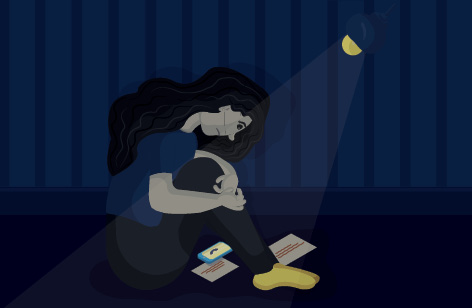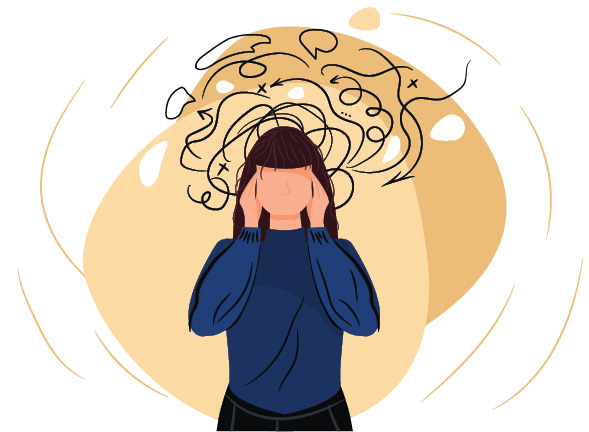Psychological trauma often,
● results from a sudden and unexpected unfavorable event.
● is a threat to safety of the person.
● leads to an intense feeling of sadness, stress, terror and fear.
Coping with the impacts of such an event can be very challenging for the person.
What are these traumatic events?
Traumatic events may be natural disasters, while they may also be man-made incidents.
The examples of traumatic events may include, but not limited to, wars; acts of terrorism; forced displacement; natural disasters such as earthquake and flood; fire; accidents; physical, psychological or sexual abuse; neglect; loss (e.g. the sudden death or loss in other terms of a loved one); kidnapping; being physically or sexually assaulted; being diagnosed with a life-threatening illness; and events such as witnessing a dangerous incident or accident.
After such events, the person may feel a sense of terror that they consider impossible to cope with, which can have a radical impact on them not only in their daily life but also for the rest of their lives.
These unfavorable events may be unusual or “abnormal” events that occur rarely, which may be perceived to be not experienced by many. However, people’s reactions to such events are normal reactions. Psychological trauma describes normal human responses to abnormal events.
Each individual may have a different reaction to the same event. For example, those who go through the same natural disaster may react very differently despite having a similar experience. This is not about the person’s strength or weakness. Our body’s reaction to such events are automatic.
Some people react to such an event by “fight”, some by “freeze” and some by “flight”.

There is no right or wrong with these responses. They emerge instinctively and automatically based on the flow of the events. Our body, thoughts and emotions start to change during or after this experience.
It is not possible to predict who will go through such an event as a traumatic experience. An event that seems very common and easy to overcome for one person may be the cause of psychological trauma for another.
It would be better to use another example to explain the impact of trauma in our lives more clearly. Our brain functions as a camera and records whatever happens in our daily life. This record is coherent, and consists of the meanings we attribute to such coherence. After the trauma, what we remember about the events is scattered in a fragmentary fashion like photographs, instead of a continuous filmstrip. The concepts of time and place become ambiguous. We try to make sense of what is happening, piece by piece, and the coherence in our perception of the world becomes disrupted.
not:Bu paragrafın hemen yanına arkası karanlık olan yere dağılmış/parçalanmış resimlere/fotoğraflara/kamera görüntülerine bakan bir insan çizimi eklenebilir.
Our memories of the moment of trauma are quite vivid. When we remember the event, we relive what we experienced with five senses:
- If we hear a sound that we heard at that moment again at another time, we may instantly feel as if we have been teleported to the time that we experienced the event.
- A color or scent that reminds us of the event can bring us back to the moment that we experienced the event.
- Similar images that may remind us of an image we saw at the time of the event may reappear before our eyes.
- If someone touches us in the same way, we may react with fear and jump.
We may not relive the fear we then experienced in the same way and to the same extent in the present time.
This is the most important element that distinguishes trauma from everyday fears.
Each person may experience this process differently according to their past experiences and personality structure. In general, such unfavorable events may lead to intense and all-pervasive uneasiness, and extreme anxiety and fear, which may sometimes start right after the event and sometimes a little later.
A traumatized person may experience the following:
- Repeatedly reliving the moment of the event
- Nightmares
- Unstoppable thoughts
- Fear, and a constant state of uneasiness
- Anger, sudden reactions, and a constant state of alert as if an attack is imminent
- Meaninglessness of daily life, and the inability of the persons to continue their daily life from time to time
This may last for months or years. After the traumatic events, the person may begin to think that they have changed so much that they will never feel the same again.
| The symptoms may deescalate over time, but the time is not a cure-all in this respect! For people who experience more severe symptoms and have trouble coping with it, there are experts and organizations that can help them overcome the situation! |
In certain cases, the experienced event becomes tangled in the mind, and the effects of the event may be carried in the mind by the person, even if they go to other places or to a safe place. The mind remains tangled all the time.
A reminder of the smallest scale can take us back to that moment and disrupt the daily functioning of our lives. This can happen long after the event, even years later.
This can have an adverse impact in our relationships with the people around us and our relationships with our loved ones. We may realize that we feel the need to stay away from everything we used to love to do. We may begin to see the world as an unsafe place. We may completely lose trust in people.

The people generally believe that the world is a good, safe place and that bad things will only happen to the others. We think that we are in control of our lives. Being sudden and unexpected, the traumatic events can radically change such beliefs.
With such unfavorable events, a sense of extreme anxiety and uncertainty may become prominent. Sometimes, the life becomes so meaningless that the person falls into a long-term depression in a dark, unsafe and fearful world. They may be in a dull mood without any will to react to anything, where they find everything meaningless.
The impact of the trauma can be so strong that we may be dragged into the same sense of terror with every unfavorable event, and always expect the worst. We may even think that the experienced event is our fault, and this is why are experiencing it, when it is actually not our fault at all!
| As with many issues in life, we are not 100% in control in the face of traumatic events. In certain matters in our life, events may occur completely outside our control. We should not be unfair to ourselves in the face of such events that are beyond our control. |
What matters is to find the courage to look back when we feel safe enough, to overcome these negative expectations at some point and clear the mind from the expectation that the worst will happen again. The most significant reason why events leave a traumatic impact on us is not being able to get rid of that feeling of being stuck and desperate, and not being able to untie the tangle in the mind.
If we have experienced such an event, what will help us is to be aware of what awaits us emotionally. We must keep in mind that psychological trauma is a normal reaction of fear, anxiety, and anger to an extraordinary situation. We may blame ourselves but we must not forget the fact that we are only human and have limited strength. We must give ourselves time to experience all these emotions, and to heal. In the meantime, it is of utmost importance to;
- develop reliable mutual relations;
- ask for support from people and improve our existing relations, if we have anybody to ask for help and trust in this matter;
- recognize our personal strengths and limits;
- maintain our daily lives and routines, no matter how insignificant;
- make efforts to move, even if for five minutes;
- try to support ourselves, eat healthy and maintain a regular sleep pattern as much as possible;
- avoid hesitating to seek psychological support from experts when necessary;
- strive to regain control of our lives.
If you have experienced an event that you describe as heavy, it can be difficult to deal with the effects of such event and cope with the trauma on your own. In fact, constantly trying to deal with the situation can turn into a very tiring and exhausting effort.
Psychological trauma can have very severe and devastating effects on our lives. If the traumatic event has long-lasting effects and continues to cause high levels of stress, it may lead to severe mental health problems. The two most common severe mental health problems experienced after a traumatic event are depression and post-traumatic stress disorder. If the traumatic event has long-lasting impacts, you can seek professional help in this regard.
| You are not alone! |
It is natural to feel fear and doubt when seeking psychological support. You may worry that people will see you as weak or vulnerable when you ask for help. It is natural for you to feel this way. It may not be easy to open up to a stranger but you must remember that psychological support is a professional process that requires expertise. Confidentiality is essential in psychological support sessions. This is a process where the person seeking support can express their emotions and thoughts without hesitation, feel comfortable, and be heard in an environment where everything they share is treated with respect.
We should keep in mind that recovery takes time and the time we spare for ourselves is very valuable!
If you want to benefit from our mental health services, you can apply to the nearest ASAM office for further information. Sessions are held free of charge and in accordance with the principle of confidentiality.

